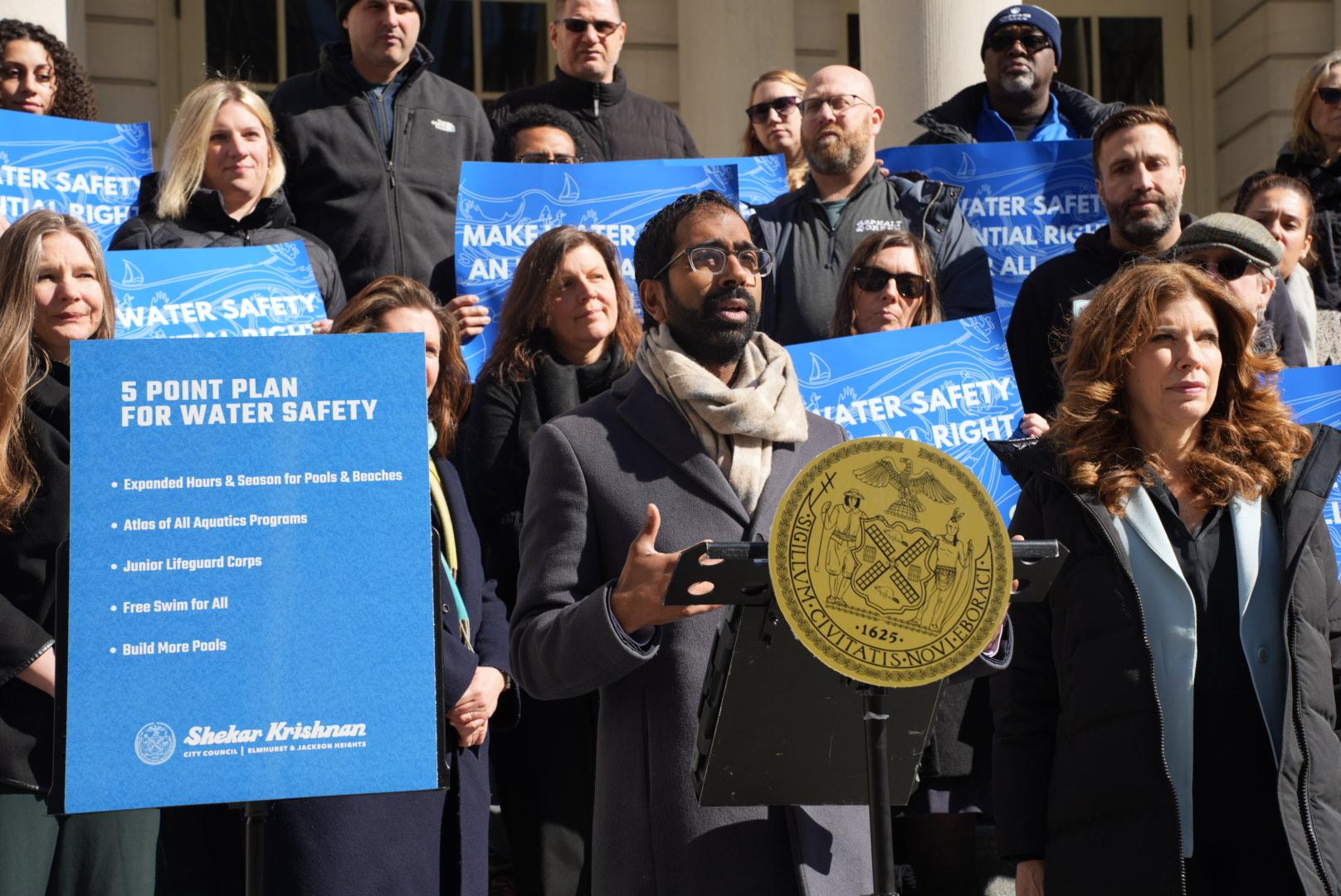To Prevent Drownings, NYC Parks Chair Shekar Krishnan and Aquatics Advocates Launch “5 Point Plan for Water Safety”

As a provider of Swim Lessons, Lifeguard and WSI Certifications, and with multiple private pool clubs, Commonpoint Queens is proud to partner with Council Member Shekar Krishnan on his 5 Point Plan for Water Safety. You can read more about the plan in a press release that was issued below, and stay tuned for more information.
New York, New York – New York City Council Member Shekar Krishnan, flanked by leading water safety advocates on the steps of City Hall, announced a “5 Point Plan for Water Safety” meant to address the crisis of drowning deaths in New York City. Per the City Council, more than two-thirds of New Yorkers do not have access to a single public pool near their homes. As a result, one in four New York City children does not know how to swim and 58 people have drowned in city waters over the last 15 years. Accidental drowning remains the leading cause of death nationally for young children, according to the Centers for Disease Control and Prevention.
“New York City is surrounded by water, and we cannot continue to allow families to lose their children to drownings every summer,” said Council Member Shekar Krishnan, Chair of the Committee on Parks & Recreation. “To be safe in the water, New Yorkers need to be exposed to the water. This means building more pools, keeping pools and beaches open longer, and providing aquatics programs to keep ourselves and others safe. We can stop this crisis now.”
“Universal swimming access is not just a matter of convenience or leisure—it’s a matter of equity, public health, and safety,” said Sharon Greenberger, President and CEO of the YMCA of Greater New York and Co-Chair of the Lifeguard & Aquatics Interorganizational Taskforce. “We look forward to our continued partnership with the City to find new ways to increase access to swim and swim instruction for all New Yorkers. We believe that we can make significant strides towards creating a city where every resident, regardless of background or circumstance, can dive into the joy and safety of swimming.”
“As an organization dedicated to providing and helping our families and young community members hone vital life skills, we are immensely grateful for Council Member Krishnan’s Aquatics Water Safety advocacy,” said Danielle Ellman, CEO of Commonpoint Queens. “Over the past year we provided over 60,000 swim lessons at 10 pools, as well as Lifeguard and Water Safety Instructor Certifications for more than 300 young people, with more support allocated to this important skill we can break the socio-economic divide that makes swimming inaccessible for so many New Yorkers.”
Jordan Brackett, CEO of Asphalt Green, said, “Asphalt Green stands with all those who work to keep New Yorkers safe in the water and we have a dedicated partner in Council Member Krishnan, who is a leader on this issue. This Five Point Plan aligns with our longstanding mission to make swimming safer and more accessible for all people. We will continue to work with our friends across the public, private, and non-profit sectors to make that mission a reality.”
Kaitlin Krause, Executive Director of Rising Tide Effect, said, “In the heart of the greatest city on earth, New York City, surrounded by its vast waters, we grapple with a preventable tragedy that disproportionately claims the lives of too many New Yorkers, particularly the young. The ‘5 Point Plan for Water Safety’ is not just a suggested plan—it’s a commitment to helping the public transform their relationship with water. By expanding access to swimming education and water safety programs, we’re taking a critical step towards prevention. Together, we can shift the tide against drowning, making water safety a right, not a privilege, for all New Yorkers.”
“Just as we teach children to safely cross the street, we should be teaching our youth how to be safe around water. The fact that NYC has fewer public pools per capita than any major U.S. city is debilitating and we must invest in the construction and operation of more swim facilities,” said Kara Meyer, Managing Director of + POOL, a floating swimming pool currently in development, that will provide free and safe access to NYC’s rivers.
Faith Behum, Senior Advocacy and Policy Advisor at UJA-Federation of New York, said, “To truly improve water safety at city pools and beaches, swim and water safety instruction must be made available to every resident in the city. New York City does not have enough pools to accomplish this. Nonprofits must be partnered with and funded adequately, particularly in poorer, under-resourced areas to increase the number of people accessing these life-saving lessons. Nonprofits with pools have the infrastructure in place and connections to their local communities to support the city’s efforts in improving water safety for its residents.”
“We applaud Council Member Shekar Krishnan’s ‘5 Point Plan for Water Safety’ to address the alarming statistics surrounding drowning deaths in New York City,” said Casper Lassiter, Director of Children’s Aid’s Dunlevy Milbank Center and member of the New York State Temporary Commission to Prevent Childhood Drowning. “As we navigate these crucial steps, let’s also celebrate the transformative power of swimming. By expanding access to pools, developing future lifeguards, and fostering aquatics programs, we not only save lives but also unlock the countless benefits that swimming brings to our communities. Together, we can turn the tide on this crisis.”
Shanna Blanchard, Chair of the Water Safety Coalition, said, “We are thrilled that Council Member Shekar Krishnan and the City Council are prioritizing water safety so that New Yorkers can more equitably and safely enjoy our city of water. This five point plan for water safety is a critical step in delivering the necessary skills, knowledge, and resources New Yorkers need to positively engage with their coastlines and live with and understand the water around them.”
The plan calls on New York City to lead on the following five initiatives:
1. Expanded Hours & Season for Pools & Beaches: Open hours should be 8 a.m. to 8 p.m. and the bathing season should run from mid-May to mid-October. This will add 4 hours each day and 7 weeks each season, effectively doubling the cumulative time that New Yorkers can use outdoor pools and beaches.
2. Atlas of All Aquatics Programs: The Department of Parks and Recreation should create a public, searchable, web-based map, listing both public and nonprofit pools and beaches, as well as programs available at each site. The map should link directly to registration pages for these programs.
3. Junior Lifeguard Corps: The Department of Education should launch a Junior Lifeguard Corps, using students, school pools, and City or nonprofit staff to provide lifeguard training. The program will allow New York City students to satisfy physical education requirements, while also developing a meaningful career.
4. Free Swim For All: The Department of Parks and Recreation and the Department of Education should work with nonprofits to provide universal access to free swim instruction for 2nd graders. The City should also invest in a significant expansion of free swim programs for adults.
5. Build More Pools: The City and State must leverage all resources, public or private, to build more publicly-accessible pools in every borough, prioritizing the communities that lack them.
After the announcement, Chair Krishnan held a public hearing on water safety in New York City, hearing from aquatics advocates on longstanding issues with the hiring of lifeguards, hurdles to nonprofit use of public pools, and the need for dedicated funding to support swim programs.


